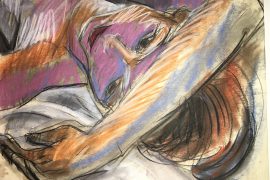I hadn’t always felt that way. In grade school I was a last-picked kid. A series of operations on my leg and hip had made me weak and limpy, and for a few years I couldn’t even run. Ballet helped me, and gymnastics. But outdoor activities, especially in the woods, where every part of you has to be focused and strong, were beyond my reach.
Nonetheless, I was drawn to the outdoors. I begged my parents for a pair of cross-country skis for my 13th birthday. My parents obliged, shelling out a handsome sum of $100 for the package. That week my older brother Chris and I went out together on the trails beyond town. The equipment felt floppy and awkward, and I tripped over the sticks on my feet and at the ends of my arms. My brother soon disappeared ahead of me into the drifts. I lagged behind, tired, alone, lost on the unknown trails, unable to make my limbs work right, unable to move forward. I remember crying, having to press on to find my brother, feeling last, and utterly alone.
I continued to try to use my skis, not because I enjoyed it, but because I knew how much a hundred dollars meant to my parents, and I wanted them to feel like they were getting their money’s worth.
When I enrolled at Dartmouth College I signed up for a Freshman Trip, a hiking experience that’s somehow supposed to prepare you for four years of academic rigor. I took an easier trip, a three-day jaunt over the mountains with a dozen other first year students and a couple of adult guides. I’d never hiked before, let alone carrying a 35-pound pack, and I was never one for indoctrinating group activities. But this was something almost every freshman did, so I figured I should try to fit in.
I was miserable. The tendons in my knees and hips became inflamed the first day, and I trailed behind the others. One of the trip leaders was a man who seemed to me to be a hundred years old (he was perhaps seventy). By the end of the trip he was carrying my pack, plus another young woman’s pack, plus his own, an added humiliation. The lone photo I have from that experience shows our ragtag band posing on a rocky summit. I’m sitting in a corner of the photo with taped knees and a thin smile, looking not quite part of the group.
My first husband was outdoorsy and liked to hike. He wanted to take me out with him and I obliged, mostly because I wanted to please him, but I’m sure I held him back. My hip continued to bother me, a sharp, searing pain deep in my joint from leftover scar tissue. He carried my water and our extra gear, protecting me from exertion. I approached each outing with trepidation, a fear of having to endure not only my physical pain, but also my shame about being so slow and imperfect.
Later, after that marriage ended, I started going to the gym and lifting weights. I got stronger. I got some physical therapy on my hip and legs. I developed muscles and endurance. For the first time I began to feel physically competent.
I started dating Steve. Steve is a mountaineer and a rock climber, and he has summited all the mountains taller than 4,000 feet in Vermont and New Hampshire in both summer and winter. (Actually, he’s missing one in winter, and this slightly irritates him.) He’s been on a one-month trek to Denali in Alaska, which, at 20,320 feet, is the tallest mountain in North America. But he can’t technically say he’s climbed Denali, even though he got 97% of the way to the top; after almost three weeks out and two attempts, his party got within 600 feet of the summit when weather turned them away. They knew they could make it to the top, they just weren’t sure they could make it back.
Steve feels most fully alive when he’s in the mountains, and, like my first husband, he wanted me to share this with him. Sharing it would mean sharing himself: a deep intimacy. And so, despite my trepidation, we started to hike together. Again, at first, I went along to oblige him. But this time it felt all new. Steve gave me space to take my time and learn to do it by myself. Being stronger made a difference: my hip no longer hurt, and I could carry my own weight. I could focus less on the physical work of hiking, and this let me lift my eyes, see past myself to the wild beauty beyond: a breeze blowing a flurry of hobblebush petals into a black stream; a riot of mice boiling from their forest hole, driven mad by disease or a snake in their den; a pine marten, huge eyed, peering at us from a tree; the woods lit gold with beeches in fall’s final curtain call.
The summer Steve and I got married we took almost weekly excursions to the mountains. Often I led the hike, setting the pace. Though I’d begun to like hiking, I still tottered on the edge of belief in my competence, and my fear of being left alone, left behind, was not yet in abeyance. My leading the hike wasn’t really about not wanting to feel second to Steve, it was about not wanting to feel second to world, falling behind with every step.
One weekend that summer we headed to Mount Mansfield in Vermont. It isn’t called Mansfield for nothing: from a distance, the ridgeline looks like the profile of a man’s face. You summit him by climbing, Lilliputian-like, up the side of his skull, over his forehead, nose, upper lip, lower lip, until you finally mount the peak of his chin, waving your puny arms in triumph. The Hell Brook Trail, the one we picked that day, accesses the summit from the northeast, bypassing a few of his features and heading straight to the top. We were to go over the summit and back down the Long Trail, closing the loop along the road.
Hell Brook. It was aptly named. The first mile or so was like taking the stairs in pairs. Then it got really steep, and in places it was hand-over-hand climbing. It was wet, because of the brook, and it was slippery. But despite its technical difficulty, plenty of people hike this trail each year, so every time our hand looked for a hold, there was one there, sometimes in the form of a twisted tree root, sometimes in a hefty chunk of rock, burnished smooth with years of wear. It was weirdly comforting to be in the company of these invisible others who’d come before.
We climbed steadily. Each time I cleared a really steep pitch I looked backward with a nervous thrill. Steve was looking out for me, but also, astutely, letting me handle myself. The trail was difficult, but I was gaining confidence, and beginning to taste the delicacy of success.
We soon arrived at a sheer rock face about 15 feet high. I paused and I tried to think it through. The guidebook’s admonition clanged in my head: “Descending the trail is not recommended.” I studied the face for handholds, footholds. I strategized my route. Steve was ahead of me and hollered down a couple pointers he’d learned the hard way. I lifted off, moving smoothly over the rock, pushing down my fear, staying focused, pulling myself up. Arm over arm, placing my feet precisely, putting my weight against the rock in upward flowing motion. Don’t stop, keep moving. The only way out is through, but don’t think about that now, push that aside, think only of now, of what’s right before you, and what’s next this instant, and this.
Soon afterward, we popped out of tree line. The trail turns sharply there, then runs over a bump called Adam’s Apple before tracing the rest of the mountain’s face. The wind was blustery and buffeting. I asked Steve what lay ahead. “It gets steeper for a bit, just before the summit.”
Steeper? It seemed impossible. I took a deep breath to gather my energy. I was pushing my limits, and I was doing really well, but I imagined a boundary around my success: enough for now, enough triumph, and then I rest. I wasn’t certain how much more challenge I could countenance. It wasn’t so much the physical exertion. Something else had been put in motion, like a slow leak in my psychic energy, imperceptible at any single moment, noticeable only through accumulation, only by looking backward.
We passed a cutoff trail that connected to our return route. Now we were completely exposed, the trail wending its way forward through huge gray boulders, switching back and forth over the stone face of the mountain. I began to list to one side, pulled like a pendulum toward the mass of the mountain, toward its solidity and sureness, away from the steepness below. The wind was tugging at me, and I was fighting it, fighting my anxiety. I became very quiet. Each step sent me deeper into myself with growing dread and worry.
I don’t remember the moment of arriving at that place. It was just a little level pullout in the trail, a jumble of rocks much like the other places we’d passed minutes before. Behind us was the bony path we’d come up. Beside us, like a rough stone ladder, loomed the last few hundred feet of mountain. And ahead of us in the trail just there, right there, was a little weed, and a little stone, and then a ledge, and then a thousand feet of air.
My mind reeled forward in time. I watched myself taking one wrong step, falling, flying, pitching forward into air. I watched Steve taking one wrong step, falling, flying, pitching forward into air.
The blood rushed from my head and my knees unlocked. I crumpled to a heap in the trail, collapsing into my center of gravity, hugging the mountain, clutching at the earth, shaking furiously, completely unhinged, terror pouring through me in waves.
Steve held me and tried to comfort me. I tried to calmed down and stop blubbering. I ate a little something and took some water. We sat there for a long while, in silence. I tried not to look at the ledge, because each time I did I would start crying again, shaking inconsolably.
Three people passed us on their way down, smiling, saying Hi. I thought they must be completely insane. I smiled back meekly, putting on a face that said I was just taking a breather, but I could barely watch them pass so casually along that edge of air.
We sat there a long time, me wrestling with my rational mind. This was a trail. People walked on it. It was made by being walked on. But no matter how I turned it around in my mind, I could not imagine myself going forward.
And worse, I couldn’t imagine Steve going forward either, the torment of watching him walk past that ledge, his doom so vivid in my mind. Steve is a mountaineer. He can handle himself on this terrain. He wanted to bag the summit. How could I ask him not to? It was a twisted little crux: To turn back with me, or go ahead alone? What would it mean, to do either one?
We picked our way back down to the cutoff, dipping gently into the woods to join the Long Trail. The way was gradual and easy. I didn’t feel tired. I didn’t feel anything. I felt empty, but whole. I walked along in silence, behind my new husband. I was last at the car.




